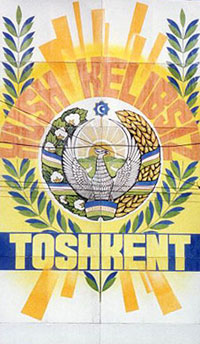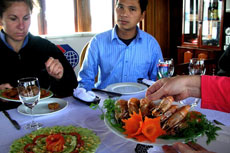Human Flower Project
Saturday, May 28, 2005
The Sudden Gardens of Tashkent
Can urban flower plantings be acts of political repression?
 Tashkent placard
Tashkent placard
with the city emblem
Photo: Galen Frysinger
The nation of Uzbekistan is in upheaval, a polite way to say that people there are being killed for what they think.
Two weeks ago in Andijan, a group of demonstrators were attacked by soldiers. “Uzbek authorities claim 169 people died on May 13, most of them ‘Islamic extremists’. But activists like Muzaffarmirzo Ishakov, head of the Human Rights Society in Andijan region, say the real figure is closer to 700, overwhelmingly civilians.”
This recent account from the Institute of War and Peace Reporting describes the violence there, and the mourning. An IWPR reporter, working under a pseudonym, writes, “Some of those I interviewed said their loved ones had been shot in the back of the head, including a father of three who died when he went out to buy bread. His body was found by his father in a flower garden at the side of the road.”
While the U.S. and other nations have called for an investigation, Uzbek president Islam Karimov has dismissed these demands, claiming national sovereignty.
One especially odd story emerged from the Central Asian nation this week. Agence France Presse reported that the streets of the capital, Tashkent, are being torn up, “with gardeners…watering flower beds where only a day before there had been busy asphalt-paved road.”
The state-controlled media calls these works of “beautification,” but on the disappearing streets of Tashkent, people think differently. They say “the changes are to block easy access to the city center and thereby thwart the kind of mass rallies witnessed in the past two years in Tbilisi, Kiev and Bishkek – capitals of other ex-Soviet republics that saw protests sweep out veteran regimes.”
This intriguing article points out that after Ukraine’s “orange revolution” last year, “the main wide alley in Mustakillik (Independence) Square, where Independence Day celebrations are held, disappeared, replaced by narrow pavements surrounded by trees.”
And when citizen protests turned the leader of Kyrgyzstan out of office in March, “sections of two key roads – Sharof Rashidov Street that leads to Mustakillik Square and Buyuk Turon Street that crossed so called ‘president’s road’ – also gave way to gardens.”
In Tashkent, authorities have already banned motorcycles. The move is clearly on to obstruct people-power by clogging up public space, otherwise known as “divide and conquer.”
The sudden gardens of Tashkent are reminders that flowers are rarely innocuous or “mere decoration.” As soon as the trowels come out, we know that human purpose has stirred, whether for liberation or repression.
Culture & Society • Gardening & Landscape • Politics • Permalink




